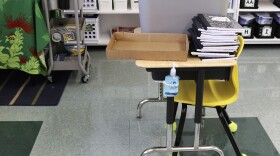The National Science Foundation has given $800,000 in grants to four University of Hawaiʻi-led projects looking at wildfire prevention and recovery.
One project will focus on trauma-informed STEM education.
UH researchers will work with Maui educators to identify how the trauma of the recent wildfires might impact students’ ability to fully engage with subjects like math and science.
Asking these questions is an important part of establishing long-term support for Maui students, said Professor Tara O'Neill, who's leading the project.
Even under normal circumstances, STEM fields can be intimidating for students. Professor and co-investigator Monique Chyba said there is often a disconnect between how teachers view their subject and students' experience.
"Most mathematicians have a very high satisfaction level of their work, right?" Chyba said. "But at the same time, the educational system is not able to translate that into educating our youth."
Prioritizing the students' enjoyment over classroom outcomes might help bridge that gap.
Such a change would require re-examining the typical reasons why teachers encourage students to pursue STEM in the first place.
O'Neill said many teachers hope that if their students show an aptitude in the sciences, they will follow that path to college and a career in a STEM field. Instead, this project wants to explore the outcomes if the primary focus of STEM education in K-12 was a "greater sense of self and sense of empowerment, and a connection to community and place."
O'Neill suspects that if students feel welcome in STEM, regardless of whether or not they intend to pursue professionally, more young people may find a lifelong home in the math and sciences.
When it comes to trauma-informed education, O'Neill said the "first focus is sustainable communities," but said that she would be delighted if students learn to love math along the way.






